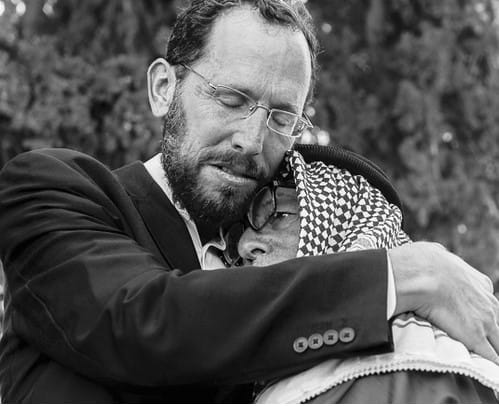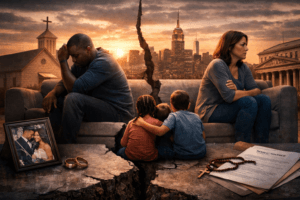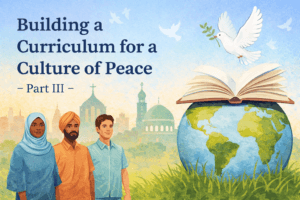The Abrahamic Union: A Vision for a Shared Middle East that is Passed Over

By Rabbi Ben Abrahamson
Why is it that a message rooted in peace, shared heritage, and religious integrity struggles to find a voice in mainstream discourse? I ask this not as a theorist from the ivory tower, nor as a political commentator chasing headlines, but as a rabbi who has spent decades in study, dialogue, and writing, all devoted to rethinking the relationship between Jews and Muslims in the Middle East.

What if the future of this region wasn’t in endless rivalry, but in rediscovered trust? What if Jews and Muslims, as descendants of Abraham and followers of divine law, could once again see each other as partners’ as co-religionists
in Noahism rather than competitors?
An article in the Jerusalem Post echoed this need, urging Israeli leadership to support Jewish-Islamic dialogue “led by figures like Rabbi Dr. Yakov Nagen… and Rabbi Ben Abrahamson.” 1 This recognition affirms what many in
grassroots interfaith circles already understand: that diplomacy without theology cannot last, and that real peace in the Middle East must be built on deeper ground.
This is not a naïve dream. It is a vision grounded in religious tradition, historic precedent, and political realism.
It is also a vision the world seems unwilling to hear. We will explore that.
A Pan-Abrahamic Middle East.
The proposal is an “Abrahamic Union” – a regional alliance modeled loosely on the European Union, but grounded in religious identity and mutual covenant. Some have referred to this as “Islamic Union”, but the meaning would not be “Islamic” in the narrow nationalistic sense, but in the Qur’anic sense: submission to the One God, Creator of all.
In this model, Jews and Muslims coexist as equal citizens in a shared civilizational space, each governed by their own religious law (Halakha and Sharia), cooperating across borders through trade, education, and culture. Such a model draws inspiration not only from Andalusia and the early days of the Hijaz, but from the deeply compatible legal and ethical frameworks preserved by both traditions.It is not utopian—it is historical.
Why It’s Ignored
Yet this vision remains largely absent from mainstream media and institutional academia. Why? Because it challenges too many paradigms at once. It is too religious for secular diplomacy, too universal for nationalist frameworks, too cooperative
for those profiting from conflict. It doesn’t fit the neat binaries of liberal vs. conservative, West vs. East, Jew vs. Muslim.
It dares to suggest that not only can we live together—but that we were meant to.
The Path Forward
The Abraham Accords showed that political normalization is possible. Now we must build the theological infrastructure to match. That means:
- Encouraging translation and dissemination of Jewish texts in Arabic and Islamic texts in Hebrew.
- Supporting joint study of law in a religious context, not just political theory.
- Developing legal and educational systems that allow Jews and Muslims to live side by side under their respective traditions.
- Encouraging religious leaders—not just diplomats—to take part in shaping regional identity.
Through the AlSadiqin Institute, I’ve published over 50 books and led collaborations between Muslim and Jewish scholars on shared jurisprudence, historical roots, and mutual respect. These include studies on Islamic eschatology, the Noahide laws, and the shared pilgrimage calendar that once united Jews and early Muslims.
I say it as a call to action.
The Abraham Accords Were Just the Beginning
The Abraham Accords hinted at something historic. But they remain transactional—a set of security and economic agreements between states. The real transformation will come only when the religious and cultural
foundations of the Middle East are addressed.
That means going deeper than diplomacy. It means seeing the other not just as a “partner for peace,” but as a fellow servant of God. It means restoring a shared sense of sacred purpose. Imagine a Middle East where Jews feel at home in Cairo, and Muslims can study in Tel Aviv, and religious leaders collaborate to solve moral crises—from corruption to climate.
This is not fantasy. It is future—if we have the courage to embrace it.
A Call to Scholars, Leaders, and Seekers
If you’re a scholar, I invite you to look again at the deep compatibility between Halakha and Shariah. If you’re a journalist, cover the stories of Muslim-Jewish cooperation already happening at the grassroots. If you’re a policy-maker, think beyond the nation-state paradigm. If you’re a believer—of any kind—join us in building an Abrahamic community of conscience. It’s time we stop seeing Judaism and Islam as locked in an eternal struggle and begin seeing them as neighboring tents in the house of Abraham.
Let the descendants of Isaac and Ishmael rise—not in war—but to help complete each other’s destiny, one that is shared among all the Children of Abraham.














